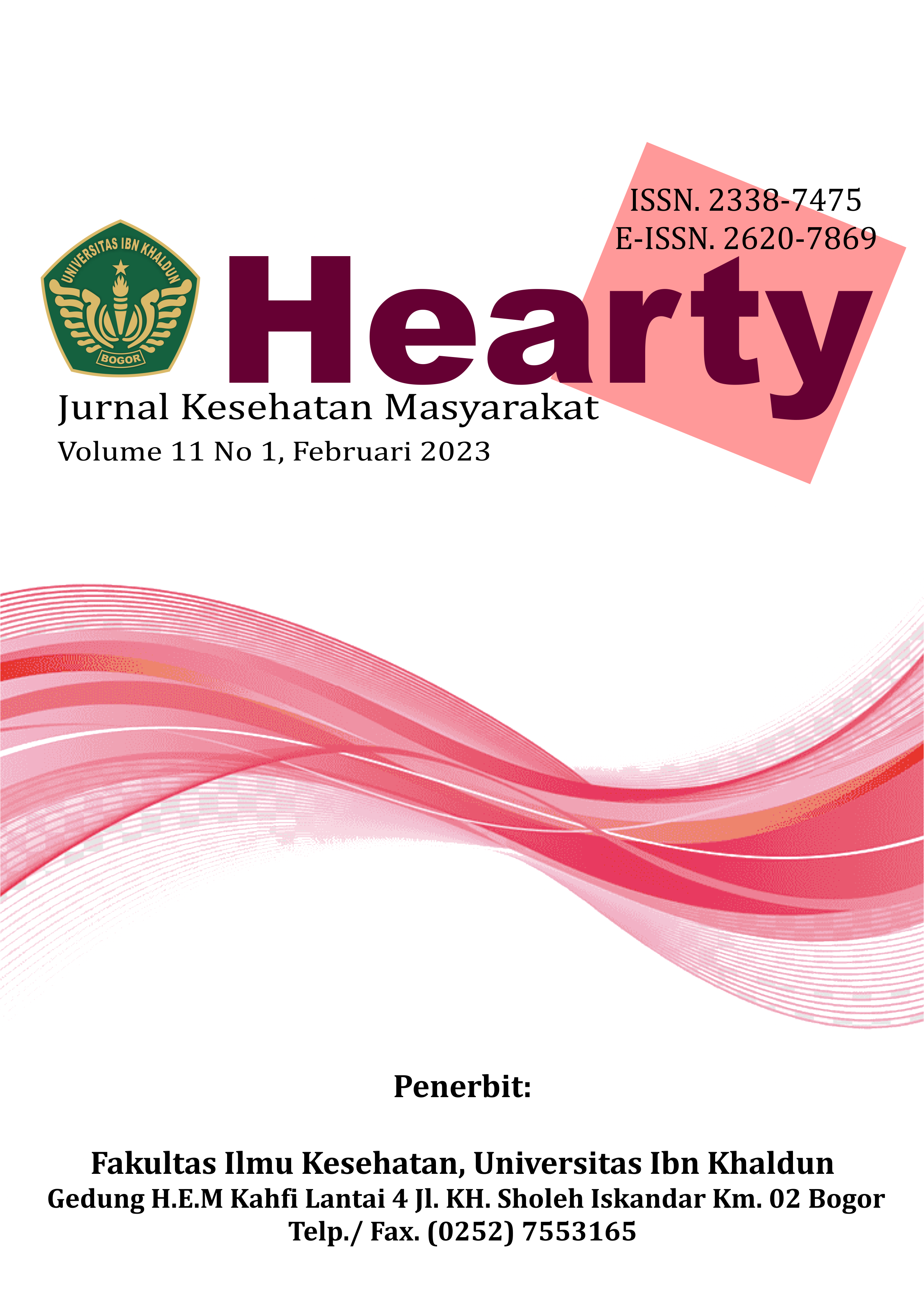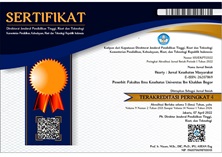PENGARUH PSYCHOLOGICAL FLEXIBILITY TERHADAP CABIN FEVER PADA KELOMPOK USIA EMERGING ADULT DI MASA PANDEMI COVID-19
DOI:
https://doi.org/10.32832/hearty.v11i1.8480Kata Kunci:
psychological flexibility, cabin fever, pandemi COVID-19Abstrak
Psychological flexibility merupakan komponen psikologis yang berkaitan dengan kapasitas individu dalam merespon secara fleksibel tantangan kehidupan baru yang ditemui. Pada beberapa studi komponen ini diketahui bermanfaat pada terjaganya kesehatan mental individu di masa pandemi. Penelitian ini bertujuan untuk mengetahui pengaruh psychological flexibility terhadap kecenderungan cabin fever pada kelompok usia emerging adulthood di masa pandemi COVID-19. Penelitian ini melibatkan 108 partisipan dengan rentang usia 18-25 tahun yang termasuk dalam kategori emerging adulthood. Instrumen pengukuran dalam penelitian ini adalah Psychological Flexibility Questionnaire (PFQ) dan Cabin Fever Scale (CFS). Metode yang digunakan adalah penelitian kuantitatif dengan teknik analisis regresi linear sederhana. Berdasarkan hasil penelitian diketahui bahwa psychological flexibility memiliki pengaruh signifikan terhadap tingkat cabin fever di masa pandemi COVID-19. Semakin tinggi skor psychological flexibility berpengaruh pada semakin rendahnya skor cabin fever. Selain itu, berdasarkan analisis tambahan menggunakan data demografi diketahui bahwa kelompok partisipan dengan aktivitas ibu rumah tangga dan kelompok partisipan freelance memiliki skor cabin fever yang lebih tinggi dibanding kelompok partisipan aktivitas lain di masa pandemi.Referensi
. R. S. Grenier. Cabin Fever Learning: Escaping the Pandemic When There's No Place to Go. 2021.
. M. Christo, L. Dian Saraswati, A. Udiyono, and D. Sutiningsih. Mixed Methods Systematic Review : Kejadian Cabin Fever Selama Pembatasan Sosial Saat Penyebaran Penyakit Sars, Mers Dan Covid-19. Jurnal Epidemiologi Kesehatan Komunitas 6(2), 2021, 307-316, 2021.
. L. Hawryluck, W. L. Gold, S. Robinson, Stephen Pogorski, Sandro Galea, and Rima Styra. Psychological Effects of Quarantine for SARS. Emerging Infectious Diseases. Vol. 10, No. 7, July 2004, 2004, [Online]. Available: www.cdc.gov/eid
. H. Jeong et al.,. Mental health status of people isolated due to Middle East Respiratory Syndrome. Epidemiol Health, vol. 38, p. e2016048, 2016, doi: 10.4178/epih.e2016048.
. G. Forte, F. Favieri, R. Tambelli, and M. Casagrande. The enemy which sealed the world: Effects of COVID-19 diffusion on the psychological state of the Italian population. J Clin Med, vol. 9, no. 6, pp. 1–14, Jun. 2020, doi: 10.3390/jcm9061802.
. R. Tindle and A. A. Moustafa. Psychological distress, social support, and psychological flexibility during COVID-19. In Mental Health Effects of COVID-19, Elsevier, 2021, pp. 89–101. doi: 10.1016/B978-0-12-824289-6.00012-X.
. Y. Firmansyah, E. Su, I. Buntara, H. Hendsun, F. I. Sutjipto, and P. N. Setiyati. Uji Kesahihan Internal dan Kehandalan Kuesioner Cabin Fever Phenomenon (CFP) Versi Indonesia. Jurnal Muara Sains, Teknologi, Kedokteran dan Ilmu Kesehatan, vol. 4, no. 2, p. 443, Oct. 2020, doi: 10.24912/jmstkik.v4i2.8456.
. Chin Wen Cong and Mohtaram Rabbani. Development of Cabin Fever Scale in Malaysia. Journal of Cognitive Sciences and Human Development, vol. 7, no. 1, pp. 115–122, Mar. 2021, doi: 10.33736/jcshd.2324.2021.
. A. Sugianti et al.. Gambaran Kecenderungan Cabin Fever pada Mahasiswa Fakultas Keperawatan. Jurnal Keperawatan Jiwa(JKJ): Persatuan Perawat Nasional Indonesia Volume 29-36, Februari 2022, vol. 10, pp. 29–36, 2022.
. R. D. Estacio, D. D. Lumibao, E. A. S. Reyes, and M. O. Avila. Gender Difference in Self-reported Symptoms of Cabin Fever among Quezon City University Students during the Covid19 Pandemic. International Journal of Scientific and Research Publications (IJSRP), vol. 10, no. 9, pp. 848–860, Sep. 2020, doi: 10.29322/ijsrp.10.09.2020.p105102.
. R. D. Estacio, D. D. Lumibao, E. A. S. Reyes, and M. O. Avila. Gender Difference in Self-reported Symptoms of Cabin Fever among Quezon City University Students during the Covid19 Pandemic. International Journal of Scientific and Research Publications (IJSRP), vol. 10, no. 9, pp. 848–860, Sep. 2020, doi: 10.29322/ijsrp.10.09.2020.p105102.
. T. B. Kashdan and J. Rottenberg. Psychological flexibility as a fundamental aspect of health. Clinical Psychology Review, vol. 30, no. 4. Elsevier Inc., pp. 865–878, 2010. doi: 10.1016/j.cpr.2010.03.001.
. L. M. McCracken, F. Badinlou, M. Buhrman, and K. C. Brocki. The role of psychological flexibility in the context of COVID-19: Associations with depression, anxiety, and insomnia. J Contextual Behav Sci, vol. 19, pp. 28–35, Jan. 2021, doi: 10.1016/j.jcbs.2020.11.003.
. D. L. Dawson and N. Golijani-Moghaddam. COVID-19: Psychological flexibility, coping, mental health, and wellbeing in the UK during the pandemic. J Contextual Behav Sci, vol. 17, pp. 126–134, Jul. 2020, doi: 10.1016/j.jcbs.2020.07.010.
. R. Chen, Y. Bao, and Z. Li. From being trapped to breaking through: manifestations of cabin fever in young people in response to COVID-19 and suggestions for adaptation. China Journal of Social Work, vol. 14, no. 2, pp. 133–152, 2021, doi: 10.1080/17525098.2021.1932542.
. Ben-Itzhak S. The Psychological Flexibility Questionnaire (PFQ): Development, Reliability and Validity. 2014.
. C. Wen Cong. Cabin Fever Scale: CFS. doi: 10.13140/RG.2.2.13351.29606/2. 2020.
. K. I. Pakenham, S. Bursnall, J. Chiu, T. Cannon, and M. Okochi. The psychosocial impact of caregiving on young people who have a parent with an illness or disability: Comparisons between young caregivers and noncaregivers. Rehabil Psychol, vol. 51, no. 2, pp. 113–126, May 2006. doi: 10.1037/0090-5550.51.2.113.
. K. I. Pakenham, G. Landi, G. Boccolini, A. Furlani, S. Grandi, and E. Tossani. The moderating roles of psychological flexibility and inflexibility on the mental health impacts of COVID-19 pandemic and lockdown in Italy. J Contextual Behav Sci, vol. 17, pp. 109–118, Jul. 2020. doi: 10.1016/j.jcbs.2020.07.003.
. A. B. Rosalina and I. I. Hapsari. Gambaran Coping Stress pada Ibu Rumah Tangga yang Tidak Bekerja. Jurnal Penelitian dan Pengukuran Psikologi, vol. 3, no. 1, 2014.
. K. Putri and H. Sudhana. Perbedaan Tingkat Stres Pada Ibu Rumah Tangga yang Menggunakan dan Tidak Menggunakan Pembantu Rumah Tangga. Jurnal Psikologi Udayana, vol. 1, no. 1, pp. 94–105, 2013, [Online]. Available: http://news.menits.com/post/2748654930/2013/04/07/.html,
. E. Parlapani et al.,. Intolerance of Uncertainty and Loneliness in Older Adults During the COVID-19 Pandemic. Front Psychiatry, vol. 11, Aug. 2020, doi: 10.3389/fpsyt.2020.00842.
. A. Al-Rabiaah et al.. Middle East Respiratory Syndrome-Corona Virus (MERS-CoV) associated stress among medical students at a university teaching hospital in Saudi Arabia. J Infect Public Health, vol. 13, no. 5, pp. 687–691, May 2020, doi: 10.1016/j.jiph.2020.01.005.
. M. Chodijah. Tingkat Stres Ibu Muda di Masa Pandemi Covid-19: Bagaimana Peran Resiliensi dan Sikap Sabar?. Psympathic : Jurnal Ilmiah Psikologi, vol. 8, no. 2, pp. 231–246, Jan. 2022, doi: 10.15575/psy.v8i2.14737.
























